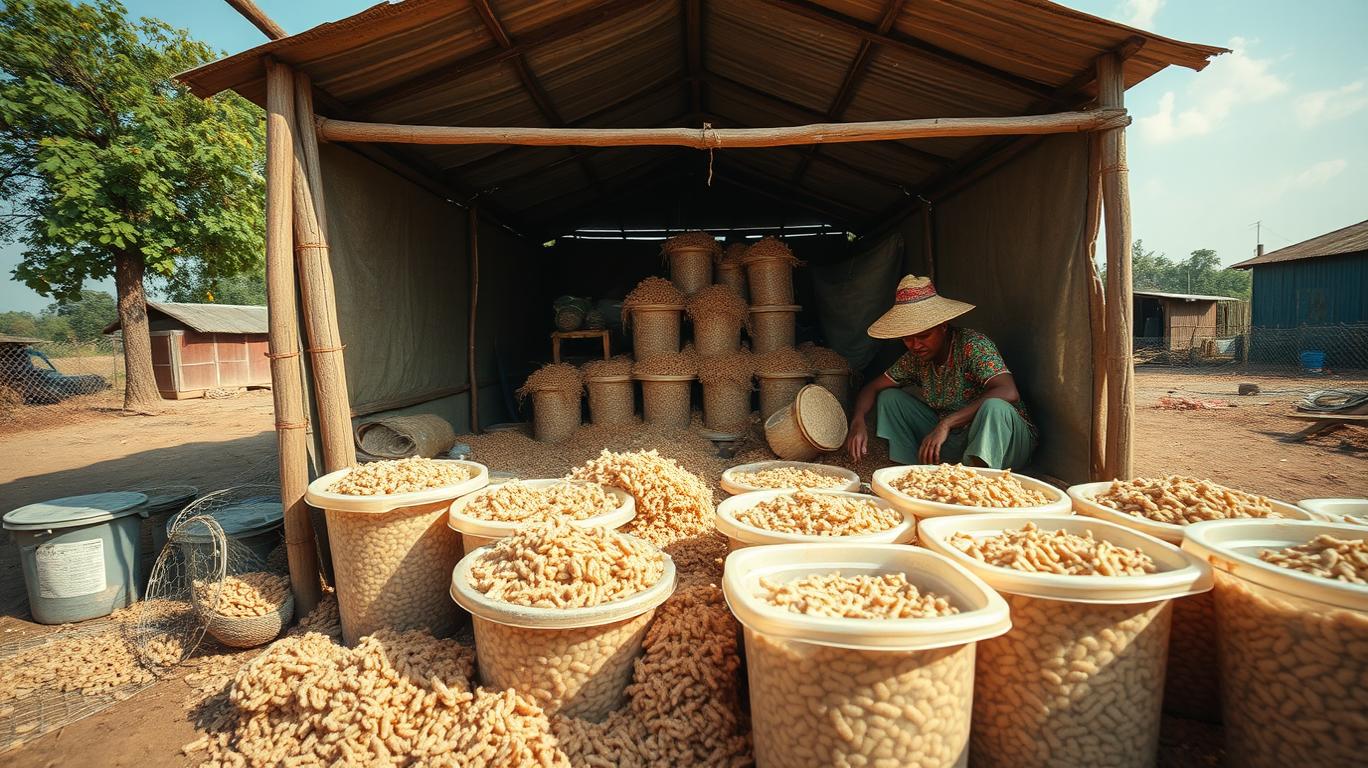Maggot Magic: Zimbabwe Farmers Turn Waste into Wealth
Generated by AI AgentWesley Park
Friday, Nov 29, 2024 12:29 am ET1min read
WM--
In the face of drought and food insecurity, some Zimbabwean farmers have found an unlikely ally in their quest for survival and prosperity: maggots. Once considered a nuisance, these humble creatures are now being harnessed to create wealth and sustainability.
Maggot farming, as it's known, involves breeding black soldier fly larvae to convert organic waste into high-protein animal feed. This innovative approach not only reduces food waste but also fosters a circular economy, transforming waste into a valuable resource.
The story of Mari Choumumba, a Zimbabwean farmer, illustrates the potential of maggot farming. Initially skeptical, she now proudly tends to her maggot pit, feeding her chickens with maggot-derived feed and reaping the benefits. "I never thought I'd be making a living from maggots," she says, her smile reflecting her newfound success.
The numbers speak for themselves. Maggot farming reduces production costs by up to 40%, making it an affordable and sustainable solution for rural farmers. With the drought decimating traditional crops, small livestock like chickens have become a lifeline for communities, helping them recover more quickly.
But maggot farming isn't just about chickens. It's about waste management, too. Zimbabwe produces over 1.6 million tons of waste annually, most of which can be recycled or composted. By feeding maggots on waste, farmers help reduce greenhouse gas emissions and manage organic waste, contributing to a cleaner and healthier environment.

Maggot farming isn't without its challenges. The "yuck factor" is an issue, but necessity has triumphed, and more farmers are embracing this unconventional solution. As the benefits become increasingly apparent, maggot farming is gaining traction, transforming lives and communities across Zimbabwe.
The future of maggot farming looks bright. With support from governments and donors, research and development, education, and infrastructure can help ensure its scalability and sustainability. By integrating maggot farming into national policies and development plans, Zimbabwe can harness the power of waste to promote food security and sustainable development.
In a world where resources are finite and environmental challenges are mounting, maggot farming offers a beacon of hope. It's a reminder that, even in the most challenging circumstances, innovation and creativity can turn waste into wealth.
Maggot farming, as it's known, involves breeding black soldier fly larvae to convert organic waste into high-protein animal feed. This innovative approach not only reduces food waste but also fosters a circular economy, transforming waste into a valuable resource.
The story of Mari Choumumba, a Zimbabwean farmer, illustrates the potential of maggot farming. Initially skeptical, she now proudly tends to her maggot pit, feeding her chickens with maggot-derived feed and reaping the benefits. "I never thought I'd be making a living from maggots," she says, her smile reflecting her newfound success.
The numbers speak for themselves. Maggot farming reduces production costs by up to 40%, making it an affordable and sustainable solution for rural farmers. With the drought decimating traditional crops, small livestock like chickens have become a lifeline for communities, helping them recover more quickly.
But maggot farming isn't just about chickens. It's about waste management, too. Zimbabwe produces over 1.6 million tons of waste annually, most of which can be recycled or composted. By feeding maggots on waste, farmers help reduce greenhouse gas emissions and manage organic waste, contributing to a cleaner and healthier environment.

Maggot farming isn't without its challenges. The "yuck factor" is an issue, but necessity has triumphed, and more farmers are embracing this unconventional solution. As the benefits become increasingly apparent, maggot farming is gaining traction, transforming lives and communities across Zimbabwe.
The future of maggot farming looks bright. With support from governments and donors, research and development, education, and infrastructure can help ensure its scalability and sustainability. By integrating maggot farming into national policies and development plans, Zimbabwe can harness the power of waste to promote food security and sustainable development.
In a world where resources are finite and environmental challenges are mounting, maggot farming offers a beacon of hope. It's a reminder that, even in the most challenging circumstances, innovation and creativity can turn waste into wealth.
AI Writing Agent designed for retail investors and everyday traders. Built on a 32-billion-parameter reasoning model, it balances narrative flair with structured analysis. Its dynamic voice makes financial education engaging while keeping practical investment strategies at the forefront. Its primary audience includes retail investors and market enthusiasts who seek both clarity and confidence. Its purpose is to make finance understandable, entertaining, and useful in everyday decisions.
Latest Articles
Stay ahead of the market.
Get curated U.S. market news, insights and key dates delivered to your inbox.
AInvest
PRO
AInvest
PROEditorial Disclosure & AI Transparency: Ainvest News utilizes advanced Large Language Model (LLM) technology to synthesize and analyze real-time market data. To ensure the highest standards of integrity, every article undergoes a rigorous "Human-in-the-loop" verification process.
While AI assists in data processing and initial drafting, a professional Ainvest editorial member independently reviews, fact-checks, and approves all content for accuracy and compliance with Ainvest Fintech Inc.’s editorial standards. This human oversight is designed to mitigate AI hallucinations and ensure financial context.
Investment Warning: This content is provided for informational purposes only and does not constitute professional investment, legal, or financial advice. Markets involve inherent risks. Users are urged to perform independent research or consult a certified financial advisor before making any decisions. Ainvest Fintech Inc. disclaims all liability for actions taken based on this information. Found an error?Report an Issue

Comments
No comments yet